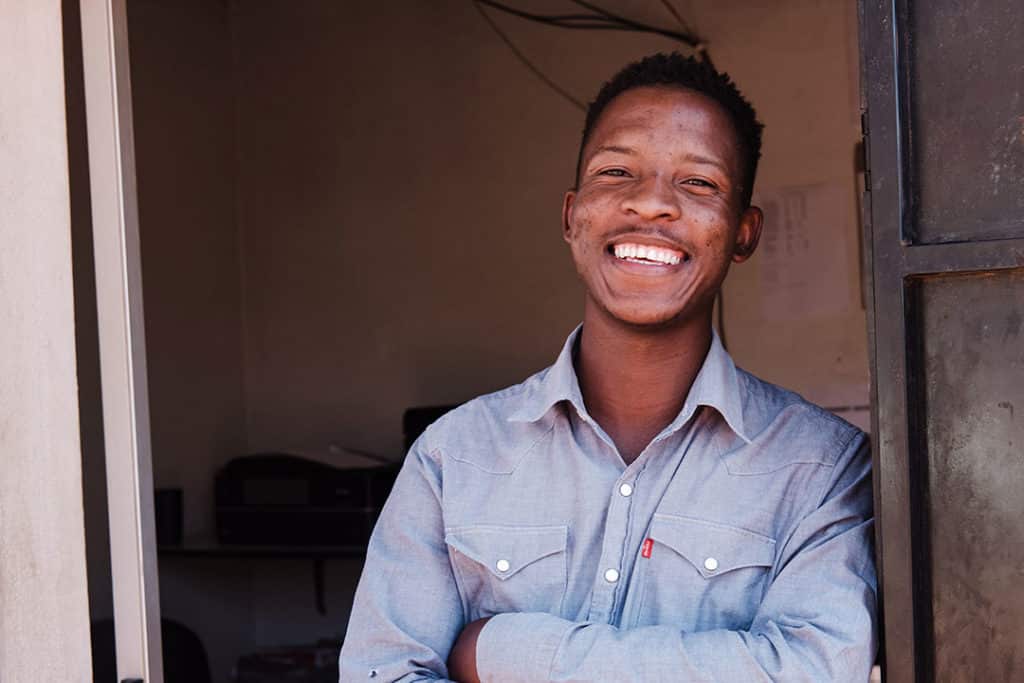A social entrepreneur’s quest for rural connectivity
Rural and informal settlements tend to struggle with connectivity. However, Given has proven that it’s possible to have flourishing internet-based business under challenging conditions

Given Maboela’s Flex Internet Cafe in Stoffel Park, an informal settlement in Mamelodi, east of Pretoria, is seeking to address digital inequality and change the quality of life for people in his community.
Maboela, 23, has joined a group of young South Africans who are about more than just making a profit. He is cleverly combining a social mission with business and successfully making an impact and helping to bring about change. All this, Given has done without a business because he faces life as it comes.
Established in 2018, Flex Internet Cafe not only provides internet access and printing but has a long list of other digital services that are changing the quality of life for the residents in Stoffel Park. The services include assisting students with academic research projects, online application services for university admission and job seekers, graphic design and photography.
“Grand sharp, I think people don’t need formal documents to make it in business. You just have to start and work that is it.”
“My services are innovative, affordable and reliable. I target young people looking to apply for employment. We assist regular household consumers with communication devices by servicing and updating their digital gadgets’ software. We help entrepreneurs with the paperless admin. We are targeting information seekers and social media enthusiasts who want to access the internet at an affordable price.”
Stepping out of the box
Given grew up in what he describes as a “very slow” environment in Ga-Mashashane Village in rural Limpopo. “We had no internet and no information centres, so people were forced to walk long distances to get internet access,” he says.
It was during those long walks that he decided his future. “l love helping people. I remember, in my teens, I started working as a social media strategist for a few private and community blogs which offer content that challenged socio-economic issues affecting our country. One of the blogs I still work for, Hello Youth, is an online blog that aims to lift and inspire young professionals in South Africa,” Maboela adds.
Challenges and lessons learnt
Like many young hopefuls, Given had dreams of obtaining a qualification but unfortunately, he had to drop out six months into his studies at Boston Media for financial reasons. Little did he know that life had bigger plans for him. His resilience and passion for what he loves pushed him to succeed.
However, getting there was no easy task, Maboela explains: “My biggest obstacle when starting this business was having people believe in the vision of what I wanted to achieve for myself and my community. Access to information and funding has been a major struggle for me and securing land so that I can increase my services and not have to deal with rent or a limited space was a challenge.”
The rise of a social entrepreneur
Maboela believes that small businesses are crucial for economic growth because they have a closer relationship with the users of their products and services. “This means that more people will be buying and that leads to economic growth and job creation.”
“My short-term goals include opening other branches similar to Flex Internet Café and to offer residents in other under-resourced communities the same kind of quality services we are currently offering.”
Long-term, Maboela’s goal is to own a community WiFi zone and be an internet service provider offering reliable, fast and affordable internet service in remote villages and other areas where people are still struggling with internet services.
The impact of Covid-19
“Covid-19 has affected my business both in a good and bad way because as a business I had to spend money on PPE, cleaning detergents and hand sanitisers which were not budgeted for. However, as a business that offers internet services, Covid-19 made me realise that the world is moving from paper to digital, which made way and allowed me to implement my soft skills and assist consumers to become technologically savvy,” Maboela says.
Amid the pandemic, an opportunity to grow and realise his potential presented itself through Ranyaka’s Building Business programme, which focuses on assisting entrepreneurs who come from marginalised communities. “It changed my life,” Maboela says.
He credits most of what he learnt in the programme to his appointed mentor Benson Mohlala, who’s a business coach. “He advised me on things I did not understand as a business. He did not only care about how my business was doing, but also about how I was doing as a person, as a young father, and how my relationship is with my family,” he says.
Winning the Building Business Social Enterprise competition elevated Maboela’s internet cafe to a new level. He explains that he now has a computer that works faster and more efficiently, a new printer and lamination machine – but what he is most excited about is how Ranyaka, thanks to the funding and support of Nedbank’s Proud of my Town programme, assisted him in branding his business.
Advice for budding entrepreneurs
Maboela’s advice to young entrepreneurs is to “never give up on your dreams and always seek information because we are now in an information-driven economy. The more you know, the more you will stay relevant in whatever business you’re in – enabling you to adapt with changes to survive.”
Last updated Friday December 17, 2021



